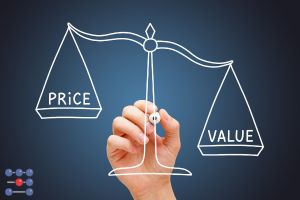 Many parties seek a business valuation when entering an acquisition, expecting that the number presented in the valuation report will reflect the final transaction price. However, the reality is often more nuanced. This article explores the distinctions between a business valuation and the transaction price, shedding light on the factors that can influence the final deal.
Many parties seek a business valuation when entering an acquisition, expecting that the number presented in the valuation report will reflect the final transaction price. However, the reality is often more nuanced. This article explores the distinctions between a business valuation and the transaction price, shedding light on the factors that can influence the final deal.
Understanding Transaction Value
The transaction value is often understood as the price at which a willing buyer and a willing seller agree to exchange ownership of a business. This value, however, is not always equivalent to the pre-transaction valuation. Several dynamics come into play during the negotiation process, which can cause the transaction value to diverge from the initial valuation.
Key Factors Influencing Transaction Value
Perception of the Valuation: How the involved parties perceive the valuation can significantly impact negotiations. While a valuation should provide a comprehensive analysis based on underlying assumptions, it is ultimately an estimate. Buyers and sellers may interpret this estimate differently, affecting their willingness to settle on a specific price.
Due Diligence Outcomes: The results of the due diligence process can either support or challenge the initial valuation. Any issues uncovered during due diligence, such as financial discrepancies or operational concerns, can lead to adjustments in the transaction price.
Nature of the Sale: The final price can also be influenced by whether the transaction involves the sale of the entire business, a portion of the shares, or a sale in tranches. The structure of the deal, including earn-out, clawback, or claw-in mechanisms, can further complicate the final pricing.
Why the Valuation is Essential
Despite the potential differences between the valuation and the transaction price, the valuation remains an essential component of the M&A process. A well-formulated valuation provides a structured approach to understanding the business value for both the buyer and the seller, considering various factors such as market conditions, financial performance, risk profile, growth expectations and strategic potential. It serves several purposes:
- It sets a baseline for negotiations, ensuring that discussions are grounded in a comprehensive analysis of the business’s potential. This foundation not only facilitates smoother negotiations but also helps in structuring the transaction effectively, considering various deal terms and risk factors.
- It highlights the opportunity cost for the Seller of accepting a lower offer, emphasising the potential benefits they may forego.
- For the Buyer, it offers insights into what needs to be achieved to justify the acquisition cost, helping them assess the feasibility of meeting financial targets and realising synergies.
- It creates a benchmark for future performance: The valuation helps set a baseline for future performance, allowing parties to assess whether additional value can be created post-transaction.
- Framework for Synergies: It enables the calculation of potential synergies, helping buyers and sellers identify opportunities for value enhancement.
- Transaction Structuring: The valuation can guide the structuring of the transaction, influencing decisions about deal terms, payment mechanisms, and risk allocation.
Conclusion
In summary, understanding the distinctions between a business valuation and the transaction price is crucial for anyone involved in an acquisition. By recognising the factors that can influence the final price, parties can better navigate the complexities of M&A transactions and achieve their strategic objectives.
While a business valuation provides a vital foundation for understanding a company’s worth, it is not synonymous with the transaction price. The final price that results from negotiations is influenced by various factors, including due diligence findings, deal structure, and each party’s negotiating power. However, a well-constructed valuation remains a critical tool in the M&A process, providing a framework for discussions and helping parties make informed decisions.
How Worth.Business can help
At Worth.Business, we specialise in conducting business valuations and managing the entire M&A process for Buyers or Sellers. Whether you need only a business valuation, assistance with specific aspects of the transaction, or more comprehensive support and transaction facilitation from start to finish, our expertise ensures that you achieve the best possible outcome.
Other related articles:
